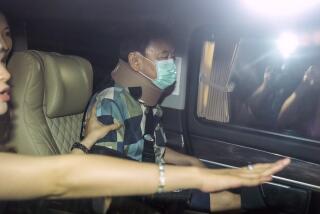No Freedom for Tortured Myanmar
- Share via
Does the unexpected release of Aung Sung Suu Kyi, the Nobel Prize-winning opposition leader of Myanmar, once known as Burma, warrant the lifting of international diplomatic and economic sanctions against the repressive ruling military junta? The answer, plain and simple, is no.
At this point, there is little more than hope for a new political openness in Myanmar. The military’s release of Suu Kyi last week after nearly six years of house arrest is long overdue but is a mostly symbolic action. The junta, known as the State Law and Order Restoration Council (SLORC), still must yield power to the civilian representatives elected by the people five years ago. It also must free imprisoned dissidents and stop using forced labor.
Suu Kyi founded the National League for Democracy in 1988 in response to the military’s massacre of civilians during pro-democracy demonstrations. She was placed under house arrest in 1989 “for endangering the state.” Nevertheless, her party triumphed in national elections in 1990.
However, the military voided the election results, silenced opposition and has managed to destroy Suu Kyi’s political apparatus. The junta has said it will not give up power to civilians until a new constitution is drafted, a development for which no timetable has been set.
Is Suu Kyi’s release merely a part of the SLORC’s expensive public relations campaign to improve its image and attract investment? Last year, the military retained former U.S. Rep. Lester Wolff of New York as its registered lobbyist in Washington. Also, it has dealt with Van Kloberg Associates, a Washington public relations firm, and has allowed a few members of Congress to visit. Yet within Myanmar, the military-controlled media have blacked out news of Suu Kyi’s release.
What SLORC desperately wants is legitimacy, not democracy, so that the World Bank, International Monetary Fund and Asian Development Bank will lend or grant aid to Myanmar. Outside pressure must not let up until the military restores the rights of the Burmese people.
Despite a conciliatory tone toward her former captors, Suu Kyi herself is wary. When asked how the international community should view her release, she said: “All those who are interested in democratic development in Burma should wait and see. They should see what is going to happen before changing tactics.”
More to Read
Sign up for Essential California
The most important California stories and recommendations in your inbox every morning.
You may occasionally receive promotional content from the Los Angeles Times.









